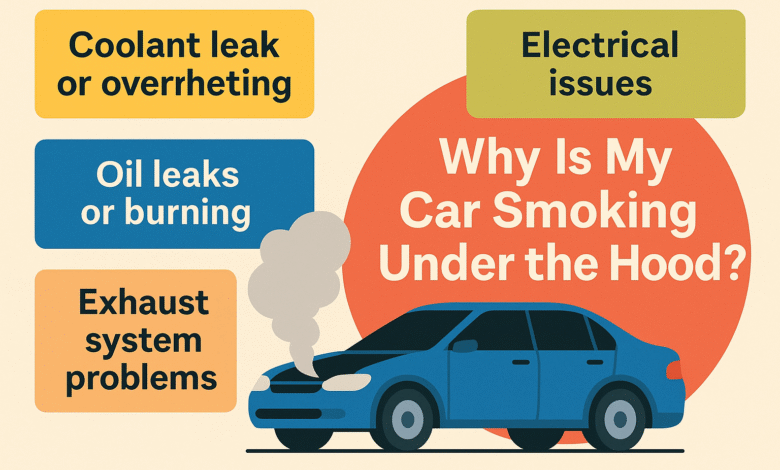Why Is My Car Smoking Under the Hood?
Understanding the Warning Signs, Causes, and Solutions for Car Smoke Problems

Introduction
Seeing smoke coming from your car is never a good sign—especially when the smoke is coming from underneath the car’s hood. Whether it’s white smoke, black smoke, or blue smoke, this phenomenon can cause panic and often requires immediate attention. So, let’s answer the big question: why is my car smoking under the hood?
This guide explores the common causes of smoke, what different smoke colors mean, and how to respond when you notice smoke while starting your car or driving. Understanding the source of the smoke billowing under the hood can help prevent long-term damage to your engine.
Quick Fact
| Item | Description |
|---|---|
| Most common cause | Coolant or oil leak hitting hot engine components |
| Smoke color clues | White, blue, gray, or black smoke |
| Risk level | Ranges from mild oil spillage to serious engine block damage |
| Check immediately | Oil level, coolant level, and exhaust conditions |
| Fix urgency | Act fast to avoid failed engine sensor or fire hazard |
Coolant Leaks and Overheating Risks
One common cause of smoke under the hood is a coolant leak. When coolant hits hot components like the radiator or exhaust system, it burns and releases white smoke or steam. You might also notice a sweet smell and dripping beneath your car.
A blown head gasket may also allow coolant to leak into the engine block, causing persistent white or gray smoke. In such cases, your car may overheat, and the check engine light may appear. Always wait until the engine cools before inspecting.
Oil Leaks and Burning Odor
Oil Spillage and Leakage
Oil spillage and leakage are frequent reasons why your car is smoking. When oil drips onto a hot engine, it causes blue smoke or gray smoke to rise from the hood. This often happens after an oil change, especially if the oil filler cap isn’t secured properly.
When you pop the hood, check for dark spots around the valve cover gasket, oil filter, or filler cap. If you notice smoke coming from those areas, an oil leak is likely. Always check your oil level when the engine cools to prevent further damage.
Fuel System and Exhaust Smoke
Rich Fuel and Injector Problems
When the fuel pressure regulator malfunctions or burning raw fuel occurs in the exhaust, you may notice black smoke from the exhaust. This could be a result of burning oil or unburned fuel igniting in the exhaust pipe.
Sometimes, smoke coming from your exhaust is caused by incomplete combustion. This smoke usually indicates a faulty injector, failed engine sensor, or poor air-fuel ratio. Black smoke usually signals excessive fuel usage and may cause your engine to lose power or even overheat.
Electrical Issues and Burning Smell
Short Circuits and Wiring Meltdowns
If the smoke has a burning smell similar to plastic or rubber, and you see smoke rising from near the battery or fuse box, then electrical issues may be to blame. This might include electrical short in the wiring, a failed alternator, or worn-out connectors.
Such smoke indicates internal contact with hot components beneath your hood. Smoke from the exhaust mixed with an electrical burning odor should prompt auto repair immediately to prevent fire.
Transmission Fluid and Miscellaneous Leaks
Fluid Burn-Off from Hot Surfaces
Sometimes, transmission fluid or power steering fluid may leak onto engine parts. These fluids can burn and send up smoke, leading to visible smoke rising around the hood. While smoking but not overheating may seem less urgent, it still suggests fluid loss or seal failure.
Even a little black smoke could signal that fluid is evaporating on hot components. If left unchecked, it may cause your engine to overheat or damage belts and sensors.
Smoking Without Overheating
Why Your Car Is Smoking But Not Overheating
A car smoking but not overheating can be caused by oil spillage, coolant spray, or even exhaust leaks. You might see smoke coming from under the hood shortly after an oil change or fluid top-up.
These cases are usually due to smoke emanating from under the hood as excess fluids come into contact with hot components. It’s best to determine the cause early—even without overheating, your engine is burning something it shouldn’t.
Diagnosing the Source of the Smoke
Step-by-Step Identification
-
White smoke coming = Coolant problems
-
Blue or dark gray smoke = Burning oil
-
Black smoke = Fuel-related or electrical issue
Use a flashlight to trace where the smoke is coming from. Check for fluid levels and observe where the smoke usually starts. A cloud of smoke while driving suggests an active leak or combustion issue.
Preventing Future Smoke Issues
Regular Maintenance
Routine auto repair and fluid checks can reduce smoke risks. Make sure the oil level when the engine is cold matches the dipstick markers. Clean up oil spillage after an oil change, and replace cracked hoses or gaskets.
Ensure your exhaust system is inspected regularly. Smoke coming from under your hood while driving is often a warning to look deeper into engine health.
Conclusion
Whether you’re seeing white smoke from the tailpipe, black smoke from the exhaust, or gray smoke from exhaust, don’t ignore it. Smoke usually indicates something is wrong—be it a coolant leak, burning oil, or electrical short.
Next time your car starts smoking, stay calm, pull over, and inspect after the engine cools. Understanding these signs could save you from a major auto repair bill and keep your engine running smoothly.
Frequently Asked Questions (FAQ)
What does white smoke mean under the hood?
It usually points to a coolant leak hitting hot parts of the engine or a blown head gasket.
Can a car smoke without overheating?
Yes, your car smoking without overheating can be caused by oil, fluid, or exhaust leaks contacting hot components.
Why does my car smoke after an oil change?
It could be leftover oil spillage or a loose oil cap. If the smoke persists, check for an oil leak.
Is it safe to drive if there’s smoke under the hood?
It depends. If the smoke has a burning smell or is black smoke, pull over immediately and seek help.
How can I prevent my engine from smoking again?
Check fluids regularly, fix leaks, and avoid overfilling. Have your car checked at the first sign of smoke coming from your car.



